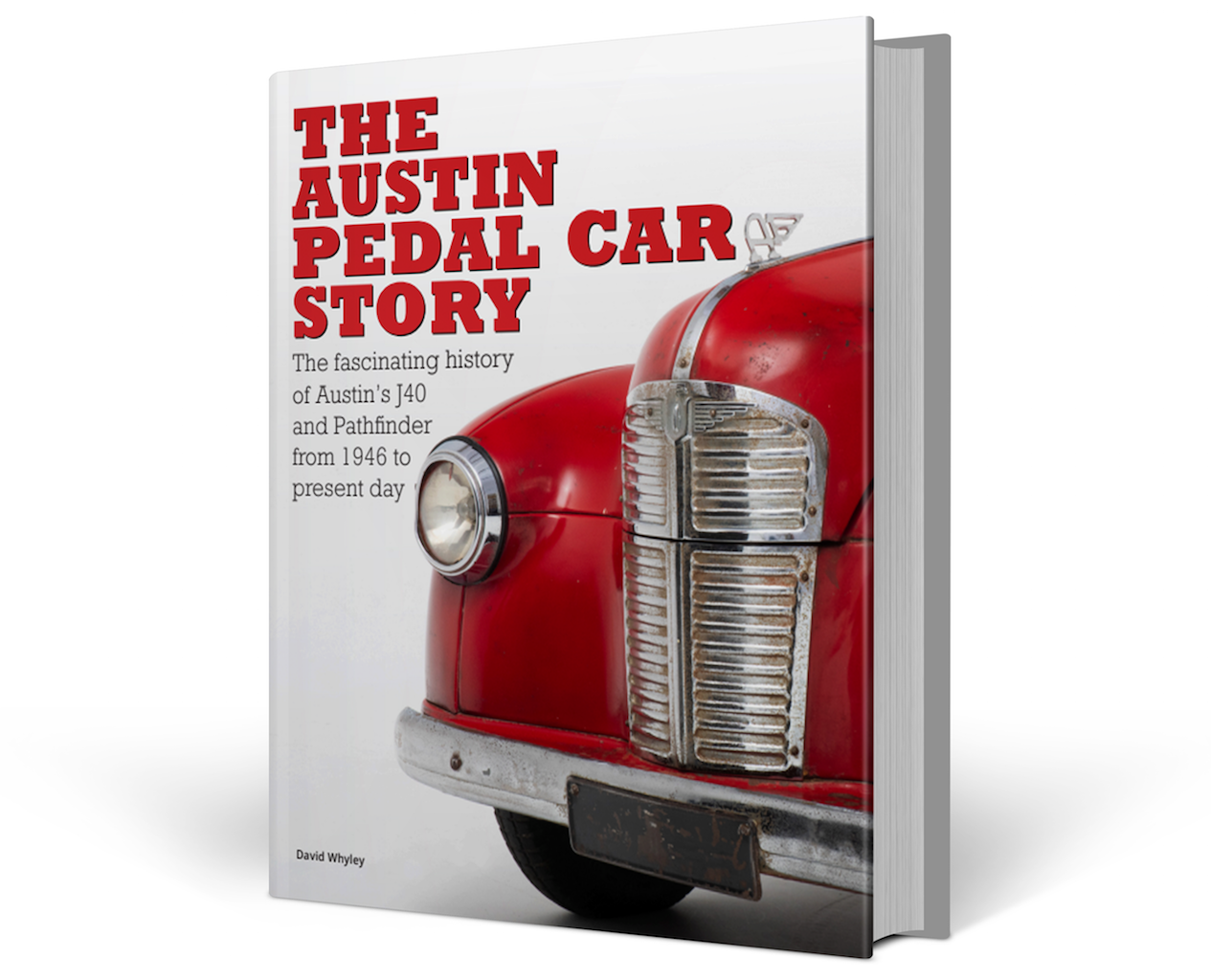 The remarkable true story of Austin pedal cars…
The remarkable true story of Austin pedal cars…
Reviewed by Kim Henson
Author: Dr. David Whyley
Published by: Porter Press International; www.porterpress.co.uk
488 pages (jacketed hardback; 280 x 220 mm), incorporating more than 1,000 images
UK Price, ‘Classic Edition’: £85.00; ISBN: 978-1-913089-28-3
Note: Further specialist editions are available thus:
Collector’s Edition – limited to 100 copies: RRP £145 (direct sales only); ISBN: 978-1-913089-99-3
Heritage Edition: RRP £2,500 (direct sales only); ISBN: 978-1-913089-00-9
The story of the Austin Motor Company has been well-documented, notably including its rise through the 1920s and 30s, the amazing performance it achieved before and after World War II in terms of sales success (including doing wonders for the essential post-War British export trade), and of course its popularity with buyers in producing reliable cars that served their owners very well.
What is less well known to many people is the fascinating story of its smallest models that were built for children but using the same comprehensive engineering approach and techniques as applied to the full-size vehicles.
The author of this extraordinarily detailed new book (published in September 2023), Dr. David Whyley, has been involved in classic Austins for many years and has written many books on the cars, including the pedal cars, as well as the Austin ‘Counties’ models that were introduced in the late 1940s.
His attention to detail and passion for his subject is evident in the text, and I should mention at the outset that this is a very ‘big’ book in every way – it’s a large format volume, comprising 488 pages and incorporating more than 1,000 images – many of which have not previously been published.
It sets out in clear terms the way in which the pedal cars were planned, developed and built, stemming from Austin Chairman Len Lord’s ‘little idea’ in 1946, and resulting in the first production example arriving in 1949. Much of the information came from those directly involved at the time, recorded in detail by David Whyley, in the 1990s.
For useful context, the Austin models of the early post-War era are described, with the styling of the prototype ‘JOY 1’ being based on that of the contemporary Austin Eight, Ten, Twelve and Sixteen.
Designer of the J40 Jim Blaikie and his team developed the car in a secret workshop at Austin’s Longbridge factory, but the cars were built in a factory at Bargoed, south Wales, set up to rehabilitate Welsh miners who were suffering from respiratory problems (silicosis) resulting from coal dust inhaled during their working lives in the pits.
The cars were developed during a time of severe shortages of steel, and the main raw material for the bodywork on the Austin pedal cars was to be sheet steel off-cuts from the main full-size Austin production lines.
In his text David Whyley describes in intricate detail the thinking behind the new ‘miniature’ Austins, including the ‘JOY 1’ prototype, the ‘Pathfinder’ racers and the J40 roadsters (always referred to as ‘Joy Cars’ by the workforce at Bargoed).
He also refers to the high quality of these vehicles, and their comprehensive specifications. For example, the J40 featured an opening bonnet revealing an ‘engine’ incorporating Champion spark plugs with dummy high tension leads, working headlights and horn, plus an opening luggage boot. The cars also featured pneumatic tyres mounted on removable wheels.
He mentions too the relatively large size of the J40 when compared with other contemporary pedal cars, such as those produced by Tri-ang, for example.
There are detailed sections within this book on ‘racing’ J40s, past and present (the Settrington Cup races at Goodwood Revival are always popular), the use of these pedal cars through the years to teach road safety, on fairground roundabouts, and their appearances in films.
Details of production figures, paint colours, dimensions and full specifications are also included.
Bringing the story up to date, David Whyley describes the re-engineered J40 and Pathfinder spares developed by enthusiast Roy Halford, from 1983, with Burlen Ltd. taking over the J40 mantle from 2020, with the Pathfinder spares business being retained by Roy Halford.
The author further details the arrival of ‘Austin Pedal Cars’ from late 2022, incorporating the former J40 Motor Company and with the business covering all aspects of the vehicles, from spare components to complete vehicles. He also describes how in 2023 the ‘Continuation J40’ (‘JOY 5’) carries on the legacy started way back in 1946, for future generations to enjoy.
VERDICT
First Class, brilliant, superb…
…In fact I find it hard to find enough superlatives for this extensively researched, beautifully presented book which should appeal to anyone interested in pedal cars or indeed Austins or the history of motor cars.
The text is well-written and easy to follow, the photographs and diagrams clear and wonderful.
I have no hesitation in recommending this book and indeed, although one of my hobbies is reading a wealth of motoring titles, I have to say that this is easily one of the very best that I have ever read and enjoyed.
Kim Henson.